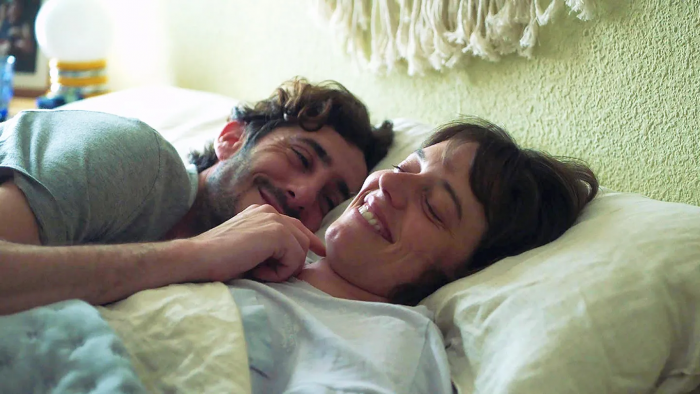

'Mamifera' Tackles the Childfree by Choice Movement
By Diana Helmuth | Film | April 10, 2024 |
By Diana Helmuth | Film | April 10, 2024 |

Mamifera is Spanish writer/director Liliana Torres’ third film, tackling the emotional pitfalls a woman faces when she aims to be childfree by choice. The story invites us into the life of Lola (Maria Rodríguez Soto), upon discovering she has become pregnant, and is forced to wait three days until she is allowed to choose to have an abortion. Most movies about unplanned pregnancies that make it into the mainstream have a tendency to handle abortion in one of three ways: it does not exist, it is an impossible ethical dilemma, or (more rarely) it is so simple it is boring. Mamifera breaks this stereotypical way of talking about abortion by offering a refreshingly original, much-needed story that goes past the ethics of abortion and instead explores the reality of being childfree by choice.
The child-free by-choice conversation is a very new one, at least in the United States. I feel like I only started reading furtive, defensive essays about the concept of women seriously electing not to have children about five years ago. I have never seen the struggle portrayed on the big screen—tenderly or otherwise — and I applaud Torres for bringing us here.
Lola is an average forty-year-old woman. Truly average. Rodriguez Soto spends most of the movie without makeup on. She is happy in her career but not a workaholic. She is emotionally complicated but not mentally unstable. She has a healthy, loving relationship with her partner Bruno (the effortlessly charming Enric Auquer). The movie refuses to cast Lola as any flavor of villain or a saint, making it very easy for an audience member to relate to her. But this does not mean Lola is boring, far from it. It should be noted that Rodriguez Soto absolutely slays this role. The amount of inner conflict she can convey through a series of pensive stares is staggering, never coming off as repetitive, trite, or over-the-top.
Lola’s life does not revolve around kids, but this is not the case for anyone else around her. All her friends are either new mothers or desperately trying to be. None of these “maternal urges” are taken for granted as the natural instincts of women, however. As the story progresses, pregnant Lola questions her maternal friends on their motivations and realities. These dialogues are perfect. I almost felt as though I was watching two voices inside one woman’s head, transposed onto a screen, as she debates topics like: guilt around becoming pregnant on accident when it’s so hard for others to conceive; how to you know if you’re cut out to be a good mom; is motherhood all it’s cracked up to be; will I regret it if I do; will I regret it if I don’t? These conversations between Lola and her friends are brief but never pithy or forced. Torres is very good about getting somewhere deep, fast.
As Lola continues to navigate her mandatory three-day waiting period, we watch her endure quiet insults directed towards childfree women, carefully placed by Torres right next to workplace discrimination directed towards new mothers. The point is clear: you can’t really win, no matter what you choose. Someone is always going to be judging you.
There is a pulsing question driving the narrative that kept me hooked: Will Lola change her mind about the abortion? Bruno, her partner, certainly doesn’t help the sensation of indecision. He is a mint-condition dream boyfriend, so nice to Lola he makes your heart ache. It’s hard to imagine not wanting to make babies with him.
Much of the film has no score, allowing Rodriguez Soto’s incredible face to take over every scene. However, in the initial act, there is lighthearted music, and it’s a touch confusing why this drops off after the first ten minutes of the film, never to return. Some levity returns when Lola dreams, and a papery, stop-motion graphic sequence takes over the screen. In these cut scenes, we watch her subconscious probe her questions and fears around motherhood, using symbolism rather than dialogue. It is not so abstract as to be confusing, however; everything is accessible and poignant. If anything, these scenes give the film a lightness, even a touch of absurdist comedy, that prevents it from collapsing into a melodrama.
The most compelling parts of this story, however, are the moments when we are alone with Lola: in the bathroom, watching her touch her belly as if it’s a bomb about to go off, or sitting with her alone in front of the computer at 2 am as she googles “women without children” and is met with a barrage of borderline hate speech.
There are two scenes in the final act that left me, quite unexpectedly, in tears — not because anyone had made a decision about whether or not to have a baby, but because I got to see Lola receiving validation, love, and acceptance from other women. Torres’ message is clear: community is the key that will unlock us from judgment.
I don’t want to spoil what Lola ultimately ends up choosing. The point of this movie is also, again, not that she gets to choose. Europe is far further ahead in reproductive rights than the United States — frankly, I don’t think this movie could have been made in the United States. We are still, unfortunately, pretty stuck on the very concept of women getting to choose to end a pregnancy at all. Of course, there are many excellent mainstream films that feature the concept of abortion - Obvious Child, Juno, Never Rarely Sometimes Always, Portrait of a Lady on Fire, even Dirty Dancing. However, I am unaware of any films that cover — as their main theme — the broader lifestyle choice of being childfree. This is what makes Mamifera so unique, refreshing, and timely. Choosing not to have children can feel incredibly isolating. Mamifera is a welcome tonic for that isolation.
‘Mamifera’ premieres at the 2024 SXSW Film and TV festival. It will debut in Spain on on April 26th.
← Austere and Brutal, 'The Settlers' Grapples With Chile's Colonialist History | Coleman Domingo Shines as a Part of a Prison Theater Troupe in the Powerful 'Sing Sing' →
More Like This
'Deadpool & Wolverine' Director Says New Film Is A 'Different Thing'
Box Office Report: I Don't Need Your Civil War
Geena Davis' Reason For Not Doing The 'Beetlejuice' Sequel Is Pretty Damn Logical
Review: ‘Sting’ is a Charming Creature Feature and What I Wanted from ‘Evil Dead Rise’
Review: Alex Garland's 'Civil War' Is A Scary Minefield of Apolitical Provocations

Hannah Waddingham Calls Out Photographer For Telling Her To 'Show Leg'
'Davey & Jonesie's Locker' Tackles The Difficulties Of High School Through The Multiverse
Megan Fox Breaks Her Silence on Chelsea Blackwell’s ‘Love Is Blind’ Resemblance Comment Controversy
Drew Carey Doesn't Think He Should Get Credit For 'Doing The Right Thing'
Reese Witherspoon Wonders if Careers Like Hers and Jennifer Aniston’s Are ‘Possible Ever Again’
'Deadpool & Wolverine' Director Says New Film Is A 'Different Thing'
More Like This
'Deadpool & Wolverine' Director Says New Film Is A 'Different Thing'
Box Office Report: I Don't Need Your Civil War
Geena Davis' Reason For Not Doing The 'Beetlejuice' Sequel Is Pretty Damn Logical
Review: ‘Sting’ is a Charming Creature Feature and What I Wanted from ‘Evil Dead Rise’
Review: Alex Garland's 'Civil War' Is A Scary Minefield of Apolitical Provocations
Reviews